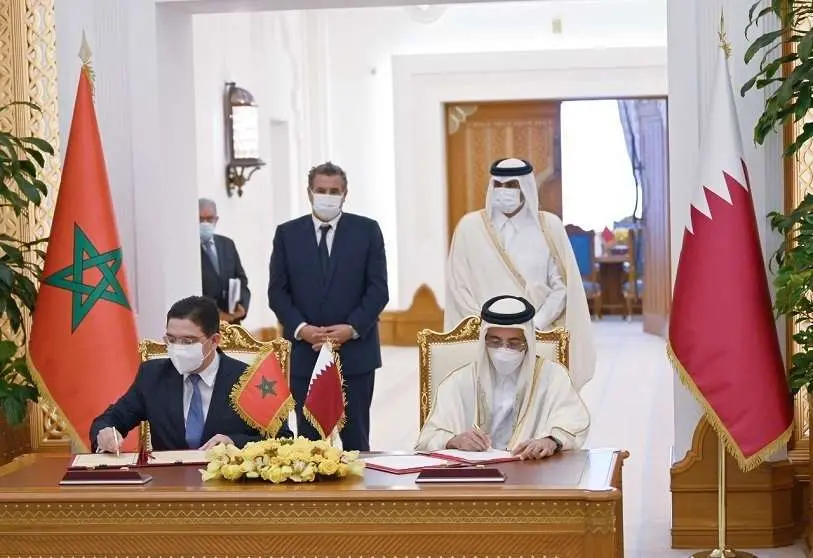Akhannouch viaja a Qatar para reforzar la posición de Marruecos en el Golfo

After visiting Riyadh, Glasgow and Abu Dhabi in his first five months in office, Moroccan Prime Minister Aziz Akhannouch landed in Doha on Sunday accompanied by several of his ministers to strengthen the Kingdom's bilateral relations in the Persian Gulf. This time with Qatar, a key partner for Rabat's aspirations in the region because of its economic and political implications.
Before the Prime Minister's arrival at Doha International Airport, where he was received by the Qatari Minister of Sport and Youth and the Moroccan Ambassador to Qatar, the delegations held a preliminary meeting to prepare for the 8th session of the High Joint Commission for Cooperation. This is a series of bilateral meetings between Rabat and Doha aimed at strengthening their relations, which had a new installment on Monday.
Postponed due to the conditions of COVID-19, the delegations of the two countries finally held a new summit, Akhannouch's third with the members of the Gulf Cooperation Council (GCC). The Moroccan head of government co-chaired the meeting with his Qatari counterpart, Sheikh Khalid bin Khalifa bin Abdul Aziz Al Thani, who also holds the interior portfolio.
Accompanying the 61-year-old tycoon, who won the September elections and ousted the Islamist PJD from power a decade later, were the ministers of Foreign Affairs, Tourism, Culture, Economy, Industry and Trade, and Energy Transition and Sustainable Development. A negotiating team made up of the main ministries of Akhannouch's cabinet, the backbone of the executive, reflecting his modernising ambitions.

The meeting resulted in the signing of a new seven-point Memorandum of Understanding (MoU). The parties have shown their intention to develop their cooperation in the areas of "Islamic affairs, tourism, accounts, culture, art, youth and sports", according to the note issued at the end of the meeting by the Ministry of Foreign Affairs headed by Nasser Bourita. These areas underline the religious and cultural union between the two countries.
But the priority area for Morocco at the moment is the economy. The 7 per cent drop in GDP caused by the health crisis hit the Alawi Kingdom's finances and pushed the new government to work on economic recovery. This is an area in which Rabat needs its Gulf partners. It was with this objective in mind that the Minister of Economy and Finance, Nadia Fettah Alaoui, travelled to Saudi Arabia and Qatar at the beginning of February.
Economic relations between Rabat and Doha, although booming, have not been as fluid as with the rest of the Arabian Peninsula. The signing of Memoranda of Understanding has been a constant between the two countries since 2011 and the Qatari state is already one of the main investors in Morocco. However, Morocco's trade relations with countries such as Saudi Arabia and the United Arab Emirates are still stronger.
In terms of exports, Morocco is Qatar's third largest trading partner in Africa, with a volume of 20 per cent, after South Africa and Kenya. Qatar, however, is not one of the Alawi Kingdom's largest markets, unlike Riyadh and Abu Dhabi. These figures reflect the close economic ties and the road that remains to be travelled between the two administrations in order to materialise joint projects.

Political relations have been a separate issue. Rabat and Doha established diplomatic representation for the first time in 1972, although it was not until 2011 that these relations began to flow with the signing of 14 agreements. Moreover, there is good harmony between the Royal Houses of Morocco and Qatar, as reflected during the 8th session of the High Joint Commission for Cooperation.
Morocco assisted Qatar when the latter was going through its most delicate moment in decades with the isolation it was subjected to by the members of the Gulf Cooperation Council in 2017. The Alawi kingdom took a central position in the midst of Doha's diplomatic rift with its Gulf neighbours, triggered by Qatari backing for Islamist movements linked to the Muslim Brotherhood that threatened stability in the region.
During the diplomatic crisis, Morocco went so far as to send humanitarian aid to Qatar. This land, air and sea blockade resulted in hundreds of millions of dollars in economic losses for the Qatari state. This blockade ended a year ago with the signing of the Al-Ula agreement, the pact that preceded the Abraham Accords, Washington's move that shook up the dynamics of alliances in the region.
Qatar supports Morocco's position on Western Sahara and its autonomy under Moroccan sovereignty despite its proximity to Algeria. The Qatari government-owned Al Jazeera's treatment of the Western Sahara issue also irritated the Moroccan government in 2010, whose communications ministry temporarily closed Al Jazeera's office in 2010 and revoked its press accreditations, but without provoking diplomatic tensions with Qatar.








